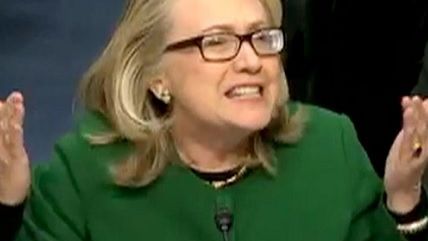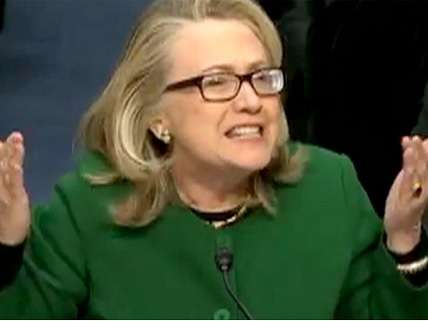Benghazi: What Difference, At This Point, Does It Make?
A lot.


It was one of Hillary Clinton's most infamous utterances during her tenure as secretary of state: "What difference, at this point, does it make?" The comment came at a Senate committee hearing on the attack in Benghazi, and it encapsulated the attitude that Barack Obama's self-described "most transparent administration in history" has taken to actual transparency.
At issue was who knew what and when about the nature of the Benghazi incident. Was it a preplanned attack by terrorists or a spontaneous response to an anti-Islamic video on YouTube? The question didn't seem to matter to Clinton, who pushed the YouTube narrative, leading the way in placing blame for the violence on an American's exercise of free speech. A little later in the same answer, she offered these thoughts about accountablity: "it is, from my perspective, less important today looking backwards as to why these militants decided they did it than to find them and bring them to justice, and then maybe we'll figure out what was going on in the meantime."
When the attack was fresh, the story of a mob killing on a whim was embraced both by officials and their boosters in the media. ("It's all about the video," Chris Matthews told a Romney supporter last October. "Read a newspaper.") Yet just three days after the assault, a report in The Independent suggested senior officials were becoming "increasingly convinced" the assault on the U.S. compound in Benghazi had been "planned." Last week's hearings helped drive home the fact that the YouTube video had nothing to do with the violence. A New York Times editorial published just last week managed to miss the point, denouncing the "Republican obsession" over Benghazi while neglecting to mention the deliberately misleading statements government officials had made about the nature of the attack.
The Sunday after the Benghazi assault, UN Ambassador Susan Rice went on the political talk-show circuit to push the narrative of a spontaneous protest. It's now been revealed that the talking points she relied on had been edited several times to excise all reference to any terrorist connection. White House Press Secretary Jay Carney deflected concern about that by pointing out that Republicans knew about the process. But that's not relevant. The issue is that the government decided to mislead the American people. Whether the revisions came from the CIA or the State Department, they sought to conceal facts from the public. And government officials didn't lean on any supposed national security concern for that deception, merely the understanding that what the American people were informed of is what they ought to know.
This "move along, nothing to see" attitude is hardly new to the Obama administration. But this president and his apologists have wrapped themselves in "the truth" in a way few of his predecessors have, even while acting in a relentlessly untransparent manner. Obama promised his would be "the most transparent administration in history," yet his administration has brought up more cases against leakers (six) than all his predecessors combined, a fact that came up in reporting on the government seizing two months' worth of phone records from the Associated Press.
The phone record seizures are part of the Department of Justice's efforts to identify who leaked information about a foiled terrorist plot in May 2012 involving an IED and a CIA operation in Yemen. "Once someone leaked information about interdiction of the IED and that the IED was actually in our possession," CIA Director John Brennan explained, "it was imperative to inform the American people consistent with Government policy that there was never any danger to the American people associated with this al-Qa'ida plot." Days before the AP found out about the foiled terrorist plot, the administration was busy insisting there was no terrorist threat around what was the one-year anniversary of the operation that killed Osama bin Laden. The leak forced the administration to acknowledge there was something where it insisted there was nothing—but Brennan's comment suggests he doesn't think the government should have had to tell the American people anything about it if it hadn't been leaked. The most transparent administration in history doesn't like to tell us all that much.
And so it is with Benghazi. When the government said it was a spontaneous reaction to unfettered online speech, the media, by and large, believed what officials said. Now the president would like us to believe it's all just a sideshow, even as important questions remain unanswered. And the most transparent administration in history becomes just a little more transparently not so.
Related video: 3 Reasons Benghazi Still Matters (original release date: May 10, 2013)


Show Comments (89)